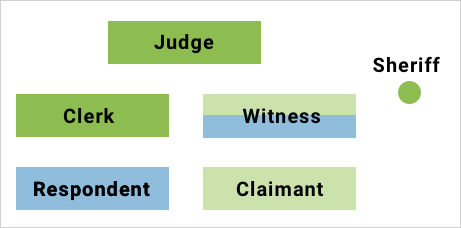Going to court can be stressful, especially if you've never been in court before. But there are some things you can do to make it a bit less stressful.
Here are some tips to help you:
- get ready for a Supreme Court trial, and
- cope with the court process.
Find out when the court's open
If you know when the courthouse opens, you can plan your day more easily. Try to arrive about 15 minutes before your trial starts.
Usually, the courthouse opens at least an hour before the first trial is scheduled to start. Trials usually happen:
- between 10 am and 12:30 pm, and
- between 2 pm and 4 pm.
But these times can change.
Contact the courthouse where your trial will be held to find out its opening hours.
Watch other trials
Family court is open to the public. That means you can watch someone else's family court trial to get a good idea of what to expect at your own trial.
Phone the family court registry or ask at the registry counter to find out when a family court trial is happening. In some places, a sheriff might ask you why you want to watch. Tell them you have a case coming up and want to see what happens.
You can sit and watch trials for as long as you like. In rare cases, the court might order that parts of the trial be done in private. If that happens, you'll have to leave.
Try to watch a trial that's similar to your own so you can see how the process works. For example, if you have a witness in your case, watch a trial where there are witnesses. This will help you get a better idea about how to put your witnesses on the stand, how to ask questions, and how to object.
See how the courtroom's set up
You'll probably feel a bit more comfortable if you know how the courtroom will be set up and who'll be there.
Here's a diagram showing how most family courts in BC are set up:
The people who work in the courtroom include:
- the judge, who hears the case and makes orders;
- the court clerk, who:
- keeps the court files,
- receives exhibits from witnesses, and
- operates the tape recorder (or computer software) that records all the evidence given at trial;
- the sheriff, who pages witnesses who aren't in the courtroom and makes sure the courtroom stays safe.
The courtroom's open to the public, so you might see people walking in and out during the trial. Also, be aware that everything that's said in the courtroom is recorded. If you're just watching, speak quietly.
Find out what to bring
You'll need to bring:
- all the documents filed with the court
- any documents you want to rely on (use to help your case) during the trial
- a pen and paper for taking notes or your laptop computer
- snacks to eat during breaks, as you could be there longer than you expect
Spend some time learning how to prepare a trial record, trial book, and book of documents.
Dress neatly and tidily
When you go to court:
- dress as neatly and professionally as you can, and
- don't wear hats or jeans. (If the only pants you have are jeans, make sure they're clean and don't have holes in them.)
Courts are usually very traditional places. You might feel you're treated with more respect if you dress as if you were going to work in an office. But it's up to you. You don't want to be uncomfortable.
Here are some suggestions for what to wear:
- Men:
- a suit and tie, or
- dress pants, a dress shirt, dark socks, and clean shoes.
- Women:
- dress pants or a skirt,
- a blouse, and
- a cardigan or (if possible) business-style jacket.
Even if you don't agree with the guidelines about how to dress, it's a good idea to look clean and tidy. The court will see this as respectful, which might be helpful to you.
Book an interpreter
If you or one of your witnesses needs an interpreter, let the court registry know well before your trial.
The Attorney General's Court Services Branch provides:
- spoken language interpreters for people who don't speak English, and
- sign language interpreters or real-time captioning for people who are deaf or hard of hearing.
These services are free. See Court Interpreters on the BC government website for more about interpreters.
Arrange for disability accommodation
Some courthouses have accessibility coordinators for people with disabilities. If you or someone who'll be taking part in your trial needs accessible court services, contact the accessibility coordinator at the courthouse. Do this as far ahead of your trial date as possible.
This material was adapted, with permission, from the National Self-Represented Litigants Project's publication, Coping with the Courtroom.

